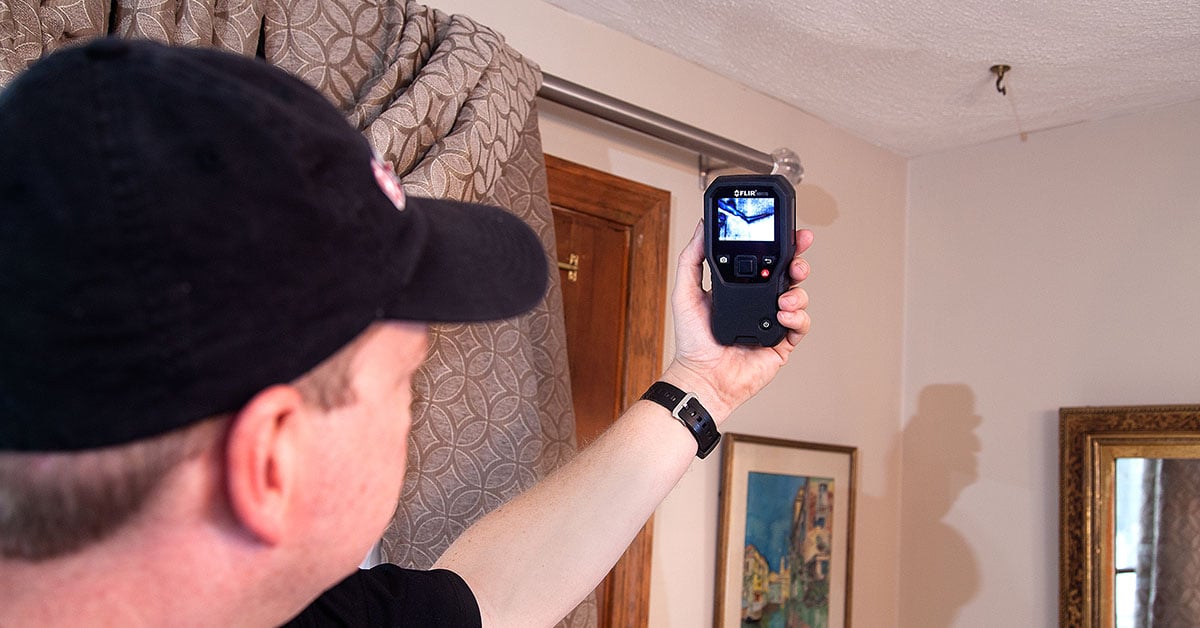Just how to Discover and Repair Water Leaks-- A Comprehensive Overview
Just how to Discover and Repair Water Leaks-- A Comprehensive Overview
Blog Article
We have found this article about Top leak detection hacks down the page on the net and felt it made good sense to talk about it with you on my blog.

Early detection of leaking water lines can mitigate a potential disaster. Some tiny water leaks might not be noticeable.
1. Take A Look At the Water Meter
Every home has a water meter. Examining it is a surefire manner in which assists you find leaks. For starters, turn off all the water sources. Guarantee no person will certainly purge, use the tap, shower, run the washing equipment or dishwashing machine. From there, most likely to the meter and watch if it will transform. Considering that nobody is using it, there should be no movements. If it moves, that suggests a fast-moving leak. Also, if you identify no changes, wait a hr or more and also check back once again. This indicates you might have a slow leakage that could even be below ground.
2. Examine Water Intake
If you find unexpected adjustments, in spite of your intake being the same, it means that you have leakages in your plumbing system. An abrupt spike in your bill indicates a fast-moving leak.
Meanwhile, a consistent boost each month, despite having the very same practices, shows you have a sluggish leak that's likewise slowly intensifying. Call a plumber to completely inspect your home, especially if you feel a cozy area on your floor with piping beneath.
3. Do a Food Coloring Examination
30% comes from bathrooms when it comes to water intake. Examination to see if they are running effectively. Drop flecks of food shade in the container and wait 10 minutes. If the color in some way infiltrates your bowl during that time without flushing, there's a leakage between the tank as well as dish.
4. Asses Outside Lines
Do not forget to check your exterior water lines too. Must water seep out of the link, you have a loose rubber gasket. One little leak can lose lots of water and spike your water expense.
5. Inspect and also Evaluate the Situation
Homeowners need to make it a routine to examine under the sink counters and even inside closets for any bad odor or mold development. These 2 warnings indicate a leakage so punctual attention is required. Doing routine evaluations, even bi-annually, can conserve you from a significant problem.
If you understand your home is currently old, maintain a careful eye on your heaters, pipes, pipelines etc. Look for stainings and also damaging as the majority of pipelines and also home appliances have a life span. They will certainly likewise normally weaken due to deterioration. Do not wait for it to rise if you believe leaking water lines in your plumbing system. Call a professional plumber as soon as possible so you don't wind up with an awful mess in your house.
Early detection of dripping water lines can reduce a potential calamity. Some small water leakages might not be noticeable. Inspecting it is a surefire way that aids you find leaks. One little leakage can squander lots of water and increase your water expense.
If you suspect dripping water lines in your plumbing system, don't wait for it to escalate.
5 Signs that Your Home Has a Hidden Leak
Your water bill is unusually high without explanation
Generally, your water bill tends to stay consistent throughout the year as long as the same number of people live in your household year round. The bill might be higher during certain times of the year, such as summer, when your lawn may require more watering than it does in cooler months. However, if you notice a rise in your water bill that you can’t explain, it’s an indicator that there’s a hidden leak somewhere in your home.
You hear running water
One of the biggest signs that you have a water leak is the sound of rushing water when no plumbing fixtures are on and when no water-using appliances are running. If you hear running water in your walls when no water is being used anywhere in your home, locate your home’s main water shut-off valve, shut off your water supply, and contact a plumber at once.
Your home smells musty
Hidden leaks often occur in dark spaces, such as behind walls or under carpeting. Incidentally, darkness and moisture can create an ideal breeding environment for mold or mildew. If you start to smell mildew or the scent of rotting wood or stagnant water around your home, it’s a fair bet that a leak is the culprit.
You find wet spots around your home
The wet spots usually show up as moist areas in your carpeting. If your home has a basement level, puddles on the floor could indicate a slab leak. Outside, unexplainable puddles or lush, green patches in your yard often mean that there’s a leak in your sewer line or main water line.
You have stains, bubbles, or condensation on your walls/ceiling
Stains or condensation on your walls or ceiling are both major signs of a hidden leak. Also, drywall (AKA. sheetrock) is very absorbent, and as it takes on more water from a leak behind a wall, it will start to bubble, swell, or warp. If you see this happening in your home, don’t wait to contact a plumber before the water damage spreads.
https://www.ezflowplumbingaz.com/blog/2019/june/5-signs-that-your-home-has-a-hidden-leak/
.jpg)
We had been guided to that article about Hacks to detect leaks through an associate on a different website. Do you know about someone else who is enthusiastic about the subject? Feel free to promote it. Thank you for your time. Visit us again soon.
Report this page